Sharing your thoughts and ideas has never been easier to do. In the past (pre-internet) sharing your opinion or updating people on your current situation was relegated to Phone Calls, Snail Mail & writing Opinion pieces for your local paper. Obviously you weren’t high lighting your latest meal with these updates.
The Internets Impact on us all
Once the internet and world wide web came around, it didn’t take long for people to start using it to share their thoughts. Email was huge (still is but not as much), Instant Messaging took off by storm and then when social media platforms came around the flood gates opened like the time of Noahs Arc. Remember Friendster?
Social media allowed for people to start instantly sharing updates with their friends families and everyone else (cause obviously having 5,000 actual friends is kind of hard). But if you wanted to share larger pieces of content, images, videos and have more control, you often needed a Blogging Platform or Website in general.
Blogging Platforms for Serious Content Writers
Blogging combines the power of Social Media Sharing and Static Websites (in my opinion). This actually makes robust blogging platforms like WordPress the ideal way to go.
Which Platform Should You Choose?
Here is a quick rundown of the most fully featured platforms to look at.

WordPress – This is the most popular option that powers an estimated 25% – 30% of the web. It has been around since 2003 and is a fully featured platform that allows you to fully customize your website from a basic blog, newspaper type site, to an e-commerce solution. It is also the most mature of all the other options and has the largest community support which means getting help with your WordPress Powered Website is just a click away. Their Documentation is Robust. WordPress Documentation . With WordPress you can fully control your website from Domain Name and where it’s hosted. This means you own it!
Pro’s – It’s highly customizable and can be virtualy whatever type of site you need it to be with thousands of free themes and plugins to use. Short Learning Curve, Large Community behind it. You own your website!
Con’s – Figuring out which theme or plugin is right for you. With so many choices, you might get over whelmed.

Drupal – Is another platform that allows you to create robust websites / blogs. It is a powerful option and has a large community of support behind it. It is considered a direct competitor of WordPress but doesn’t have the same size community behind it. That being said, their documentation is robust and you won’t have a difficult time finding answers to basic questions. Drupal Documentation. If you wanted to hire a Drupal Developer, the cost would be higher than a WordPress developer mostly because there are more WordPress Developers out there competing for your business. With Drupal you can fully control your website from Domain Name and where it’s hosted. This means you own it!
Pro’s – It’s highly customizable and can be virtualy whatever type of site you need it to be. Large Community behind it. You own your website!
Con’s – Figuring out which theme or plugin is right for you. With so many choices, you might get over whelmed. Also it’s more expensive to higher a drupal developer than a WordPress developer.

Joomla – Is another popular choice that many websites are built with. Without sounding redundant, it is extremely similar to WordPress in the sense that it is highly customizable and can be virtually any type of site that you could want. It has a large community and getting information about how to use it isn’t difficult. Joomla Documentation. With Joomla you can fully control your website from Domain Name and where it’s hosted. This means you own it!
Pro’s – Like WordPress and Drupal, it can be almost anytype of site you need it to be and you own your site.
Con’s – Con’s -Like WordPress and Drupal, figuring out which theme or plugin is right for you. With so many choices, you might get over whelmed.

Ghost – Is just a blogging platform but it’s a damn good one. It is clean and easy to use. If you are looking for a simple system to use that is easy to use, you can’t go wrong with Ghost. In it’s current version it is mostly for bloggers who don’t need many features. I say in its current version because they are adding more functionality to it. With Ghost you can fully control your website from Domain Name and where it’s hosted. This means you own it!
Pro’s – Very light weight and relatively easy to setup.
Con’s – Slow to add new features. Limited Customizations.
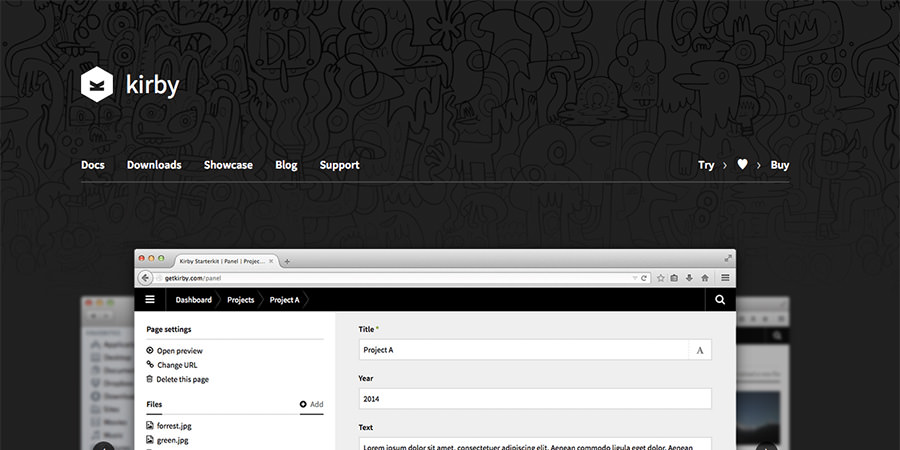
Kirby – is a flat-file CMS built using PHP. It’s very basic but offers a lot of customizability. Kirby at its core is a blog platform, but you can develop your own themes. This is more for developers. Kirby . With Kirby you can fully control your website from Domain Name and where it’s hosted. This means you own it!
Pro’s – Developers will find it easy to build custom themes.
Con’s – It’s developer centric.

Squarespace – Is a new platform that has seen a lot of publicity. It is easy to use and is only available as a hosted solution which means you use their hosting. You can have your own domain name but can’t host it on your own hosting account. With Squarespace you can own your Domain name but you are locked into their hosting solution. This is a limitation that many people aren’t comfortable with. It’s considered renting vs owning.
Pro’s – The team at Squarespace has made it extremely easy to get setup with a website and to use their various features. You can have your own domain name.
Con’s – You can only host with them. Which technically means you’re renting your website and are locked into their service.
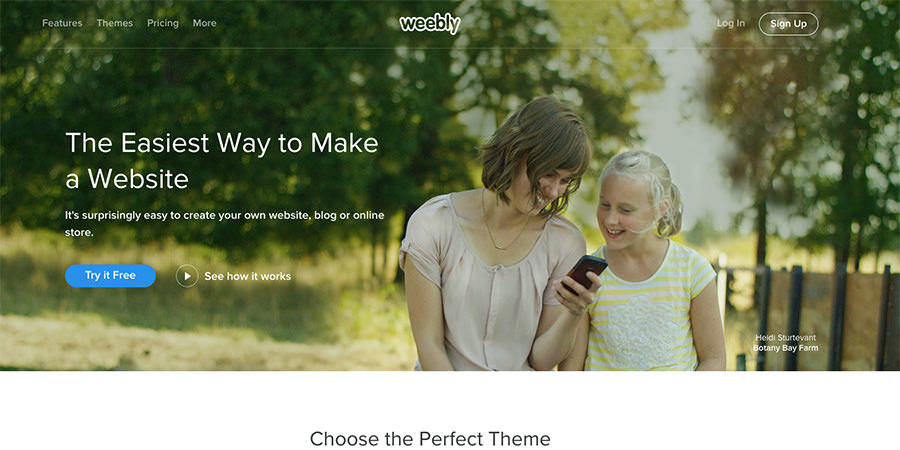
Weebly – is considered a website creation tool. Is very similar to Squarespace. With Weebly you can own your Domain name but you are locked into their hosting solution. This is a limitation that many people aren’t comfortable with. It’s considered renting vs owning.
Pro’s – Nice looking Themes and features. Easy to use tools. You can have your own domain name.
Con’s – Like Sqaurespace, You can only host with them. Which technically means you’re renting your website and are locked into their service.

Wix – Is also a website creation tool. With Wix you can own your Domain name but you are locked into their hosting solution. This is a limitation that many people aren’t comfortable with. It’s considered renting vs owning.
Pro’s – Large template options with various features. You can own your own domain name.
Con’s – You can only host with them. Which technically means you’re renting your website and are locked into their service.

Jekyll – No Database. You simply write your post, run a command and a static site made up of HTML files is generated. It is geared more towards developers since coding is a major part of using it. You need to feel comfortable with the Command Line Interface but it is known to handle large amounts of traffic with easy. Jekyll With Jekyll you can fully control your website from Domain Name and where it’s hosted. This means you own it!
Pro’s – Developers will love Jekyll because it is built by developers for developers. Powered by the folks over at Github.
Con’s – Meant mostly for developers. You need to know how to code.
Social Media Blogging Platforms
Yes, Social media giants have entered the business of blogging. Here is a rundown of whats out there.

Medium – was created by Twitter Founders with the goal of going further than the 140 character limit set by Twitter and embracing blogging in it’s purest form. It is a simple solution but is used by many content creators but has some limitations. Basically you can’t have your own domain name and very limited customization capabilities. With Medium you can’t own your Domain name and you are locked into their hosting solution. This is a limitation that many people aren’t comfortable with. It’s considered renting vs owning.
Pro’s – Very light weight and easy to use. It is a blog centric platform. Easy to create communities.
Con’s – Beyond blogging theres not many option. You can’t have a unique Domain name and hosting is through them.
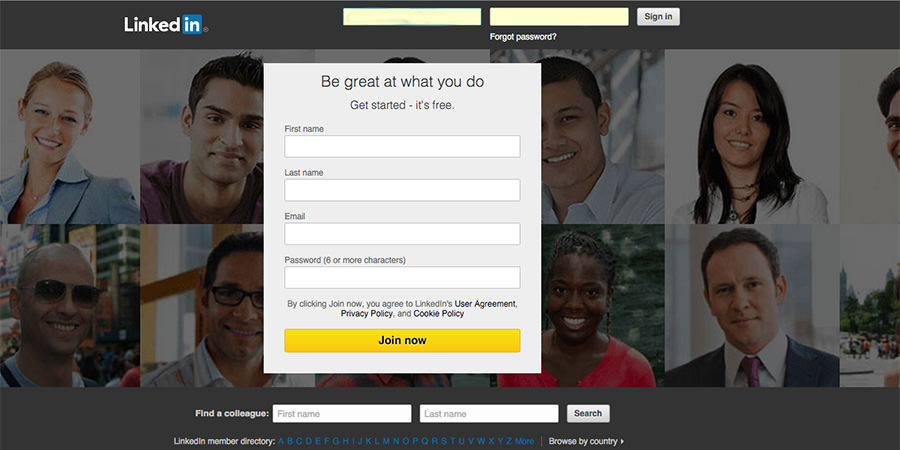
LinkedIn – has dipped it’s toes in the blogging sphere and has enabled it’s users to create content that is easy to share in and out of it’s network. It is a descent choice for those who use LinkedIn more than any other platform but with it’s limitations it isn’t recommended for those looking for a highly robust solution. With LinkedIn you can’t own your Domain name and you are locked into their hosting solution. This is a limitation that many people aren’t comfortable with. It’s considered renting vs owning.
Pro’s – Powered by LinkedIn. It is a blog centric platform. Easy to create communities.
Con’s – Beyond blogging theres not many option. You can’t have a unique Domain name and hosting is through them.

Tumblr – This is an easy to use platform that feels like a social media website / blog. It’s not really meant for serious business use but is a great choice for easily creating content to share with like minded people.
Pro’s – Very light weight and easy to use. It is a blog centric platform. Easy to create communities.
Con’s – hosting is through them.
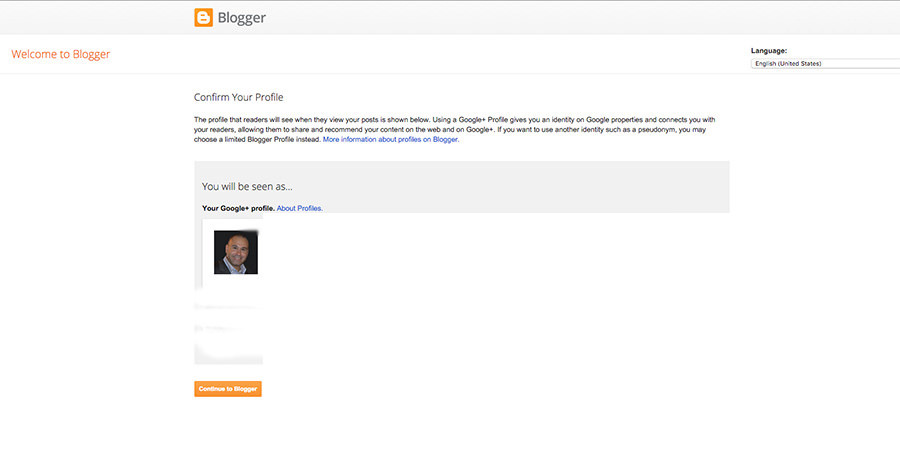
Blogger.com – This is a free solution provided by Google. It is easy to use and is mostly meant for blogging. You can’t really customize it much outside of their templates and you don’t have your own domain name. It isn’t a highly used solution these days but it’s still around. With Blogger you can’t own your Domain name and you are locked into their hosting solution. This is a limitation that many people aren’t comfortable with. It’s considered renting vs owning.
Pro’s – Very light weight and easy to use. It is a blog centric platform.
Con’s – Beyond blogging theres not many option. You can’t have a unique Domain name and hosting is through them.

Facebook Notes – This has been around for a while but has not been surface side for years. In it’s newest version it seems to be going after those who are interested in something like LinkedIn’s blogging platform, Medium and Squarespace. This is the one to watch since people spend more time on facebook than they spend with their families. With facebook notes you can’t own your Domain name and you are locked into their hosting solution. This is a limitation that many people aren’t comfortable with. It’s considered renting vs owning.
Pro’s – It is powered by facebook and hence will help with reaching others on facebook.
Con’s – Beyond blogging theres not many option. You can’t have a unique Domain name and hosting is through them.
Traditional Blogging Platforms vs Social Media Blogging Platforms
So which should you use? I would start off by saying if you want full control of your website/blog and full seo (search engine optimization) benefit, then I would choose a traditional platform. As a WordPress Developer myself I would obviously suggest WordPress but you can’t go wrong with Drupal or Joomla since they give you similar benefits to WordPress and you can fully own your content and house them on your own web host.
If you are not concerned about having a custom look and feel, owning your content or growing into a full featured eCommerce website, then maybe one of the social media type solutions might be for you. Of these I would recommend either Tumblr or maybe Facebook Notes since Facebook is where most people are. Again with this type of solution there are limitations that you might not notice at first but when you start looking into growing your website into something more, you will quickly find out why owning a website vs renting your website matters.
Owning a Website vs Renting a Website
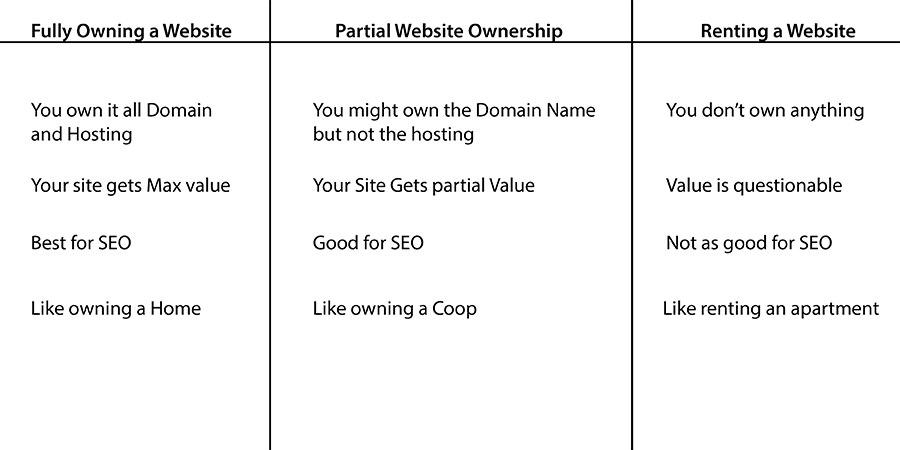
This is a major topic in itself but the gist is when you purchase a Domain Name and Purchase a Hosting account, you own your website on that account. When you join a service that controls the hosting, then you are renting a website. Some websites are fully owned where you own the domain and hosting, like a single family home. Others are partially owned when you own the domain name but rent the hosting like a Coop or Condo others are fully rented like, well, rentals.
Websites Market Value
What isn’t spoken about often is a websites market value. A website is like real estate. It has a value. You can sell your website but there are a few things to consider. Do you own a unique domain name for the site? If the answer is yes then great. Now do you own a hosting account for the site that you control? If the answer is yes then great. You can then easily sell the website. If you don’t have a unique domain name or control the hosting, then selling will be extremely difficult, maybe impossible or just might not be as valuable.
I recommend you own your website outright. From Domain Name to Hosting Account.
